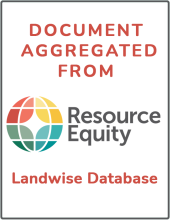/ library resources
Showing items 1 through 9 of 73418.LandLibrary Resource
31 Diciembre 2004
LandLibrary Resource
31 Diciembre 2004
Ethiopia
LandLibrary Resource
31 Diciembre 2004
Paginación
Land Library Search
Through our robust search engine, you can search for any item of the over 64,800 highly curated resources in the Land Library.
If you would like to find an overview of what is possible, feel free to peruse the Search Guide.

